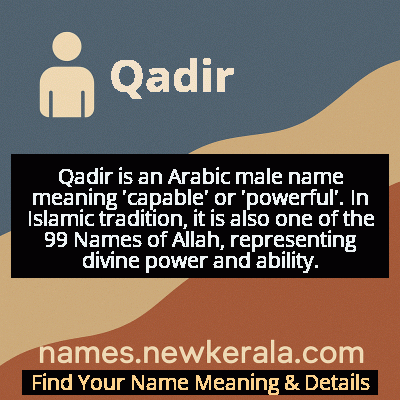Qadir Name Meaning & Details
Origin, Popularity, Numerology Analysis & Name Meaning of Qadir
Discover the origin, meaning, and cultural significance of the name QADIR. Delve into its historical roots and explore the lasting impact it has had on communities and traditions.
Name
Qadir
Gender
Male
Origin
Muslim
Lucky Number
4
Meaning of the Name - Qadir
Qadir is an Arabic male name meaning 'capable' or 'powerful'. In Islamic tradition, it is also one of the 99 Names of Allah, representing divine power and ability.
Qadir - Complete Numerology Analysis
Your Numerology Number
Based on Pythagorean Numerology System
Ruling Planet
Uranus (Rahu)
Positive Nature
Strong sense of order, loyal, practical, and disciplined.
Negative Traits
Stubborn, overly serious, rigid, and prone to feeling restricted.
Lucky Colours
Blue, gray.
Lucky Days
Saturday.
Lucky Stones
Blue sapphire.
Harmony Numbers
1, 7, 8.
Best Suited Professions
Managers, engineers, accountants, organizers.
What People Like About You
Dependability, discipline, practicality.
Famous People Named Qadir
Abdul Qadir
Islamic scholar and Sufi saint
Founder of the Qadiri Sufi order, one of the oldest Sufi tariqas
Abdul Qadir al-Jilani
Islamic scholar and preacher
Renowned Persian Sunni Muslim preacher, Sufi scholar, and the eponymous founder of the Qadiriyya Sufi order
Qadir Khan
Nuclear scientist
Pakistani nuclear scientist known as the 'father of Pakistan's atomic bomb program'
Abdul Qadir
Cricketer
Pakistani cricketer known for his all-round abilities and memorable performances in international cricket
Name Variations & International Equivalents
Click on blue names to explore their detailed meanings. Gray names with will be available soon.
Cultural & Historical Significance
Throughout Islamic history, the name Qadir has been borne by numerous scholars, leaders, and influential figures, reinforcing its association with capability and leadership. In many Muslim cultures, naming a child Qadir is seen as an aspiration for the child to develop strength of character and capability in their life's endeavors. The name also serves as a constant reminder of divine power and human potential, creating a spiritual connection between the individual and one of Allah's most significant attributes. This dual significance—both as a divine name and as a personal aspiration—has ensured the name's enduring popularity across centuries of Islamic civilization.
Extended Personality Analysis
Individuals named Qadir are often perceived as possessing strong leadership qualities, determination, and a natural capability to handle challenging situations. They tend to be resourceful problem-solvers who approach obstacles with confidence and strategic thinking. The name's meaning of 'capable' often manifests in their personality as reliability and competence in both personal and professional spheres. Many Qadirs display a calm authority and inner strength that inspires trust in others, combined with a practical mindset that enables them to turn visions into reality. They typically value self-reliance and take pride in their ability to overcome difficulties through perseverance and intelligent planning.
In social contexts, Qadirs often emerge as natural leaders who others look to for guidance and support. They tend to be decisive yet thoughtful in their actions, balancing ambition with practicality. Their inherent capability often extends to emotional intelligence, allowing them to navigate complex interpersonal dynamics effectively. While they may project strength and confidence, many Qadirs also possess a deep sense of responsibility toward those who depend on them. This combination of practical competence and emotional reliability makes them valued members of their communities and successful in leadership roles across various fields. The name's spiritual connotations may also influence some bearers to develop a strong moral compass and sense of purpose in their endeavors.
Modern Usage & Popularity
In contemporary times, Qadir remains a popular choice among Muslim families worldwide, particularly in South Asia, the Middle East, and Muslim communities in Western countries. The name maintains steady usage without being overly common, striking a balance between traditional significance and modern appeal. Recent trends show parents choosing Qadir for its strong, positive meaning and its connection to Islamic heritage. While it may not rank among the most popular names in Western countries, it enjoys consistent usage in Muslim-majority nations and diaspora communities, often chosen by parents who value names with deep spiritual meaning and positive attributes. The name's versatility allows it to work well in both traditional and modern contexts, and its clear pronunciation across different languages contributes to its enduring appeal in our increasingly globalized world.
Symbolic & Spiritual Meanings
Symbolically, Qadir represents the human aspiration toward capability, strength, and mastery over one's circumstances. It embodies the concept of empowerment and the ability to effect change through determination and skill. The name carries connotations of reliability and trustworthiness, suggesting someone who can be depended upon in difficult situations. In a broader spiritual context, it reflects the human connection to divine power and the potential for individuals to develop their own capacities while recognizing the ultimate power of the divine. The symbolism extends to concepts of resilience, leadership, and the transformative power of focused intention and action. This rich symbolic meaning makes the name not just a personal identifier but a representation of human potential and the capacity to overcome challenges through inner strength and capability.

